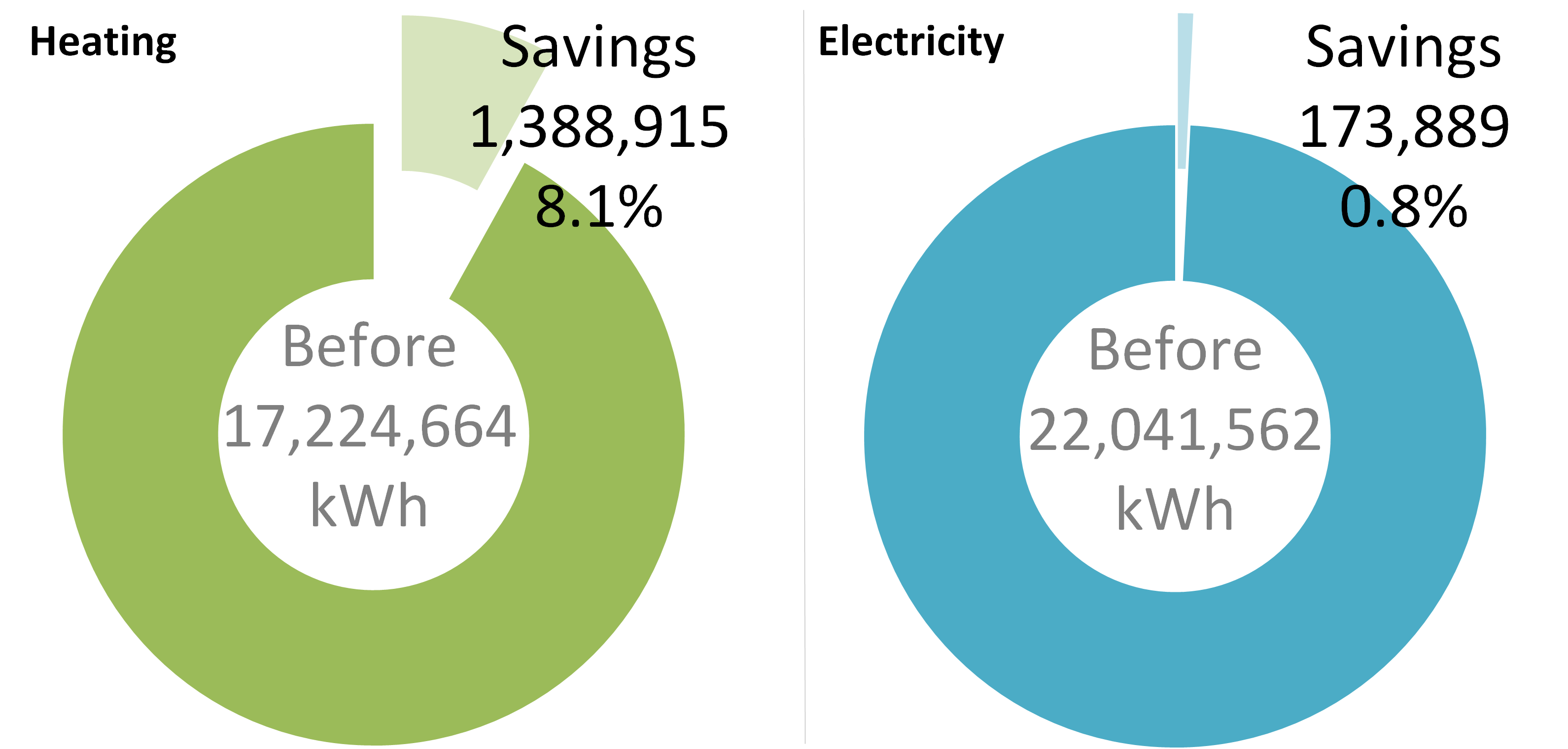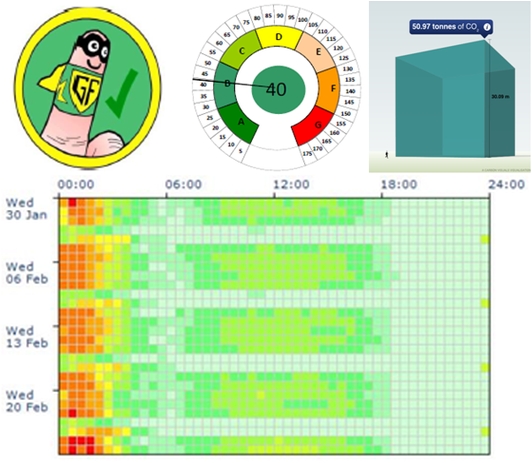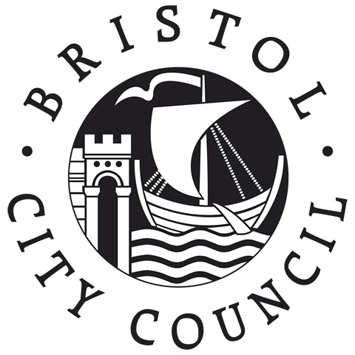Bristol¶
Video – Savings – Service – Cost-Benefit – Exploitation – Partners
Bristol site has 450 buildings in the SMARTSPACES project. These vary in age, size, construction method, usage, occupancy, and degree of central control. Because of this variance, there will be different SMARTSPACES services supplied to different buildings – with fuller services applied to buildings with higher energy consumption and higher degree of central control. There are over 11,000 staff involved in the project.
Bristol City Council has a long-term plan on carbon emissions in accordance with the CRC (Carbon Reduction Commitment) Energy Efficiency Scheme, which started life as carbon trading but has currently been modified to be a kind of carbon tax at £12/tonne CO2 (rising to £16/tonne in 2014/15). Public buildings have to be the focus, as 75% of a total of around 56,650 tonnes comes from our building stock. This can be broken down by building type with the largest users being schools (42%) and corporate buildings (36%). The local authority has to pay for each tonne of carbon it uses and also for each public school that is in its area, even those it is not in direct control of.
Video¶
Savings¶
For more details visit the eeMeasure tool and the SMARTSPACES deliverable D7.2 also covering qualitative surveys.
Service¶
Please follow this link to access the portal.
edss¶
SystemsLink is the system that is used to house all this data which for the 450 properties is in the order of 18 million bits of information every year. SystemsLink has further integrated and developed their system to enable Bristol City Council’s energy data to be analysed intelligently and provide feedback to allow energy savings to be made more promptly. Accordingly, data is analysed centrally by the energy management unit in addition to appointed and trained energy users at a building or department level (depending on the hierarchy within controllers of buildings). The information provided prompts action either locally at the individual building level or centrally at the energy management unit/BMS manager level.
Building Managers are encouraged to print out and display the Monthly SMARTSPACES reports, to allow visitors to engage with these, and learn more about energy consumption in the building they are visiting. For some larger buildings, there is still an ambition to have display screens with real-time energy data, though this has not yet been achieved.
Furthermore, there are two open data web portals run by Bristol City Council which contain further information on the Council’s energy consumption: both at an individual building level and aggregated data.
ems¶
Energy management software intelligently determines the tolerance boundaries for a building, using a variety of factors including previous consumption trends, building occupancy and type, and bank holidays. Where data values deviate outside of this, the building manager can be notified by an automatic email. The tolerance levels can be changed to make this system more or less sensitive, and other checks can also be carried out including for missing data and absolute maximum values.
The focus for Cems is on remote control, rather than automatic. This is due to the nature of “Day plus one” recording, and the set-up of existing BMS and other energy management systems in the council’s buildings. Alerts notify the Energy Management Unit and the BMS operative to allow them to make remote changes to the building’s set-up.
At a local level, building managers receive information allowing them to make changes to the building’s set-up. Feedback from building managers also improves target-setting. Analysis of individual buildings’ data can determine which ones show unusual levels of consumption in peak periods, and investigative actions can be taken. Profile alerts are also triggered if a building’s consumption in peak periods is outside of its normal consumption for that period
Improved software, and installation of AMR meters allows effective operation and accurate data collection from renewable energy sources, in particular biomass boilers and solar PV panels.
Value propositions¶
The major focus of the SMARTSPACES service in Bristol has been to convert massive quantities of raw energy data into formats that are usable for a wide variety of end users. This has allowed staff across the council to visualise their energy usage, and easily pick up on energy wastage and poor performance. This in turn has greatly reduced the time windows between issues occurring and action being taken, resulting in lower energy consumption and usage. Furthermore, it has allowed the Energy team to identify and concentrate their efforts on the most serious problems and those with highest payback solutions. As an added bonus, the SMARTSPACES project – in particular the Energy Coach function – has resulted in better communication and the building of relationships between the Energy team and the rest of the council.
The solution was designed with local authorities and other organisations with large property portfolios in mind. The fact that the SMARTSPACES service has been rigorously tested on a large and diverse portfolio, with proven results at case study level, means that we are confident in its continued usage across the council and beyond.
Another major strength of the SMARTSPACES service is the breadth of tools available, from quarterly budget reports, to next-day alerts and 24/7 at-a-glance dashboard. This also means that it is accessible to a wide range of users: including ordinary staff, energy champions, caretakers, finance officers and senior management as well as energy professionals.
Cost-Benefit¶
The SMARTSPACES project has a positive socio-economic return paying off immediately. As the majority of infrastructure is already in place, hardly any implementation cost occurs. Hence, SMARTSPACES utilises existing hardware against comparatively low implementation cost and fee increase. The ‘Do-Nothing’ scenario applied takes declining consumption into account. The clear relationship between Department and IT-provider can easily be replicated. Since many cities in the UK are to deploy smart meters, Bristol, the current European Green Capital, can work as model smart city with respect to ICT-enabled energy saving and further innovation might be triggered applying big data analysis.
Exploitation¶
As part of the development of SMARTSPACES number of modifications have been made to SystemsLink Energy Manager to allow its successful deployment. These have provided wider benefits to users across the client base. Additionally, in recent months we have been engaging with the client base on a wider basis, which has allowed us to review their requirements in more detail. This has allowed us to begin preparing the deployment to other users with a better foundation.
The existing SystemsLink clients are the initial target market, through purchasing an add-on to the Energy Manager software. The attraction of SMARTSPACES should also help attract new clients in the UK to the SystemsLink suite of products.
Bristol City Council is to setting up an Energy Service Company (ESCO) to supply a breadth of energy services, including demand reduction through SMARTSPACES tools, to other organisations.
Partners¶
`Bristol City Council <http://www.bristol.gov.uk/>`_strives to be one of the most sustainable cities in the UK and Europe and is in the process of developing a holistic approach to sustainability, in particular with regards to regeneration-based activities and energy generation, supply and networks distribution. It is also hoped that a localised energy economy can be created which provides business opportunities and helps to improve the knowledge and skills base in this field. Bristol signed up to the EU’s Covenant of Mayors Initiative in February 2009, which seeks to bring together Europe’s most pioneering cities in a permanent network to exchange expertise and knowledge. Bristol City Council will be the pilot site lead of the Bristol pilot.
Systemslink develops and sells software solutions for the Monitoring and Targeting of Energy. The core Energy Manager product allows for storage of invoice, customer own meter readings and AMR data for full analysis. Supplier EDI, BEMs, meter logger and/or AMR data may be automatically imported. Full data validation, tolerance checks and alarms provide a full set of management information. Standard or user configured reports present the information in both graphical and tabular fashion with options to automatically email to site or view through a Web browser. This Web browser interface allows sites to view all key information. The product is in use within around 200 organisations, approximately 100 of which are Local Authorities. Due to the close cooperation with Bristol City Council SystemsLink has detailed understanding of a large variety of public buildings and functions as technology partner and IT service provider in the project.







